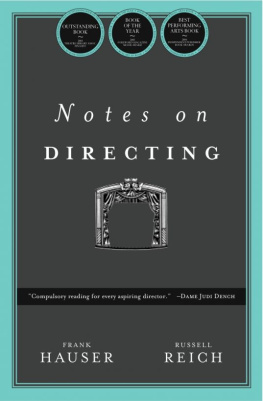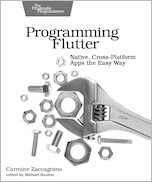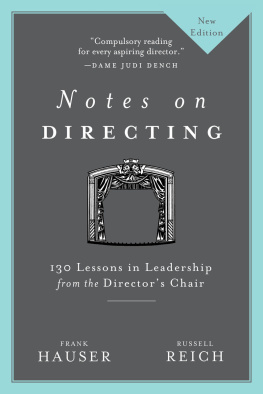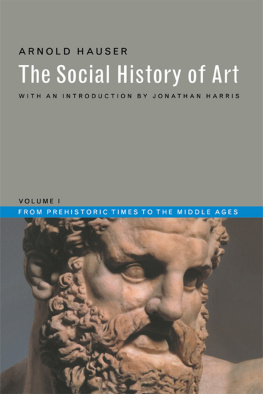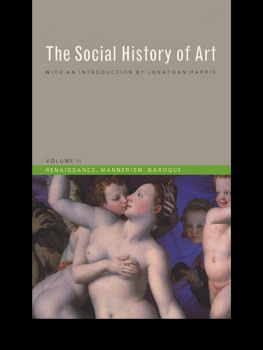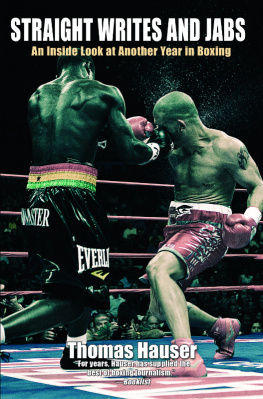Frank Hauser - Notes on Directing
Here you can read online Frank Hauser - Notes on Directing full text of the book (entire story) in english for free. Download pdf and epub, get meaning, cover and reviews about this ebook. publisher: RCR Creative Press, genre: Children. Description of the work, (preface) as well as reviews are available. Best literature library LitArk.com created for fans of good reading and offers a wide selection of genres:
Romance novel
Science fiction
Adventure
Detective
Science
History
Home and family
Prose
Art
Politics
Computer
Non-fiction
Religion
Business
Children
Humor
Choose a favorite category and find really read worthwhile books. Enjoy immersion in the world of imagination, feel the emotions of the characters or learn something new for yourself, make an fascinating discovery.
- Book:Notes on Directing
- Author:
- Publisher:RCR Creative Press
- Genre:
- Rating:3 / 5
- Favourites:Add to favourites
- Your mark:
- 60
- 1
- 2
- 3
- 4
- 5
Notes on Directing: summary, description and annotation
We offer to read an annotation, description, summary or preface (depends on what the author of the book "Notes on Directing" wrote himself). If you haven't found the necessary information about the book — write in the comments, we will try to find it.
Notes on Directing — read online for free the complete book (whole text) full work
Below is the text of the book, divided by pages. System saving the place of the last page read, allows you to conveniently read the book "Notes on Directing" online for free, without having to search again every time where you left off. Put a bookmark, and you can go to the page where you finished reading at any time.
Font size:
Interval:
Bookmark:
DIRECTING
Frank Hauser
Russell Reich
e-book 2010 by Russell Reich. All rights reserved.
Published by Russell Reich
Smashwords Edition
No part of this book may be reproduced or transmitted in any form or by any means, graphic, electronic, or mechanical, including photocopying, recording, taping, or by any information storage or retrieval system except by a reviewer who may quote brief passages in a review to be printed in a magazine, newspaper, or on the web without written permission from the publisher. For more information, please contact RCR Creative Press at www.notesondirecting.com
Although the authors and publisher have made every effort to ensure the accuracy and completeness of information contained in this book, we assume no responsibility for errors, inaccuracies, omissions, or any inconsistencies herein. Any slights to people, places, or organizations are unintentional.
First printing 2003
The proscenium illustration is adapted from a 1933 Playbill for Roberta. The artist is not credited.
Publishers Cataloging-in-Publication ( Provided by Quality Books, Inc. )
Hauser, Frank, 1922-Notes on directing / by Frank Hauser and Russell Reich. -- 1st ed.
p. cm.
Includes bibliographical references and index.
ISBN 978-0-9724255-2-0
1. Theater--Production and direction. 2. Acting
I. Reich, Russell. II. Title.
PN2053.H38 2003 792'.0233
QBI33-815
1009080706050403 54321
IN MEMORY OF
B ILL S TILES
Preface
Notes on Notes on Directing
More Notes on Notes on Directing
I. Understanding the Script
1. Read the play
2. Take a break and read it again
3. If you have any choice, try to fit the designers to the work
4. Dont finalize the designs too early
5. Read each characters part through as if you were playing it
6. Dont overstudy
7. Learn to love a play you dont particularly like
8. Identify the storys compelling question
9. Realize that the human experience is one of suffering and the resolution of suffering
10. Appreciate that character is the result of conduct
11. Understand that plays depict people in extraordinary circumstances
12. Recognize that the struggle is more important than the outcome
13. Realize that the end is in the beginning
14. Express the core of the play in as few words as possible
II. The Directors Role
15. You are the obstetrician
16. Just tell the story
17. Dont always connect all the dots
18. Keep the audience guessing
19. Dont try to please everybody
20. You cant have everything
21. Dont expect to have all the answers
22. No actor likes a lazy director, or an ignorant one
23. Assume that everyone is in a permanent state of catatonic terror
24. Lighten up
25. Dont change the authors words
26. You perform most of the day
27. It is not about you
28. The best compliment for a director: You seemed from the beginning to know exactly what you wanted.
III. Casting
29. Directing is mostly casting
30. Dont expect the character to walk in the door
31. Put actors at ease, but dont befriend them
32. Dont act with auditioners
IV. First Read-Through
33. Dont start with a great long brilliant speech
34. Dont let the actors mumble through the reading
35. Talk it out after the reading
36. Ask basic questions
37. Mark the waves in a scene
V. Rehearsal Rules
38. Work from your strength
39. Rehearsals need discipline
40. Plan the schedule a week at a time
41. Dont keep actors hanging about needlessly
42. Dont apologize when you dont have to
43. Make sure stage management get proper breaks
44. Say thank you
45. Include the crew
46. Always read the scene by yourself just before rehearsing it with the cast
47. Dont bury your head in the script
48. Treat difficult moments as discoveries
49. Dont work on new material when people are tired
50. End rehearsals on an upbeat note
51. Dont be grim
52. If you choose to allow outsiders to see a late rehearsal
VI. Building Blocks
53. Every scene is a chase scene
54. The strength of the characters wants equals the strength of the play
55. Ask: Is it nice or nasty? Big or little?
56. Every actor has a tell
VII. Talking to Actors
57. Discussion about character is best done piecemeal, as the work demands
58. Start nice
59. Make a strong entrance
60. The actors first job is to be heard
61. Sincerely praise actors early and often
62. Talk to the character, not the actor
63. Always sit and read a scene before blocking it
64. Do not expect too much too soon
65. Never, NEVER bully
66. Keep actors on their task
67. Never express actions in terms of feelings
68. Tell actors: Watch their eyes
69. Actors are notoriously inaccurate about the quality of their own performances
70. Please, PLEASE be decisive
71. Being direct is appropriate for a director, but not always
72. Give actors corrective notes in private
73. Know your actors
74. Dont give notes just prior to a performance or run-through
75. Dont assume people can take the harsh truth, even if they ask for it
76. Introduce bad news with and not but.
77. Include every single member of the cast in your note sessions
78. Always walk through changes
79. Reverse the material
80. Dont play the end of scene at the beginning
81. Play against the given condition
82. Be gentle with actors just coming off book
83. Frequently ask: Who are you talking to?
84. Anger is always preceded by pain
85. Tell actors: Localize abstract things
86. In later rehearsals, ask yourself: Do I believe it?
87. Consider late table work
VIII. Getting a Laugh
88. Humor falls mostly into one of two categories
89. Actors must never aim for the laugh
90. Play peek-a-boo
91. The best judge of humor is the audience
92. Proper audience focus is key to an effective joke
93. If a jokes not working, try reversing positions
94. Good humor requires a bad disposition
IX. Elements of Staging
95. If it moves, the eye will follow
96. Every object tells
97. Love triangles
98. When few characters are on stage in a large space, keep them apart
99. Imbalance adds interest
100. Choose a facing angle
101. Stand up
102. Dont stand still
104. An audiences interest in the action is only as high as the actors interest in it
105. Listening is active
106. Character reactions should be active and outward, not passive and inward
107. Turn your back
108. Give your actors face time
109. Style has its reasons
110. Consider if youre missing a costume moment
111. Respect the power of music
112. Use sound to prompt the audience to imagine the unseen, off-stage world
113. Acting solutions are always better than technical solutions
114. Beware the naked truth
X. Last Tips
115. When a scene isnt clicking, the entrance was probably wrong
116. Blocking problem?
117. When a scene is well acted, clearly understood, and boring
118. When a scene is well timed, well acted, clearly understood, and STILL boring
119. Listen for overzealous vocal entrances
120. Listen for actors who drop the ends of lines
121. An actor is lost in his role
122. An actor dries completely on his lines in performance
123. If an actor abuses you publicly, stay calm
Font size:
Interval:
Bookmark:
Similar books «Notes on Directing»
Look at similar books to Notes on Directing. We have selected literature similar in name and meaning in the hope of providing readers with more options to find new, interesting, not yet read works.
Discussion, reviews of the book Notes on Directing and just readers' own opinions. Leave your comments, write what you think about the work, its meaning or the main characters. Specify what exactly you liked and what you didn't like, and why you think so.

